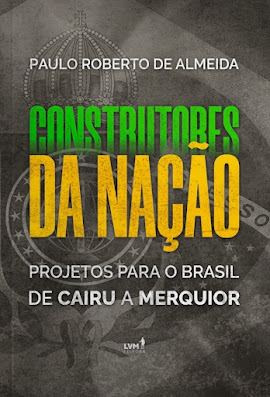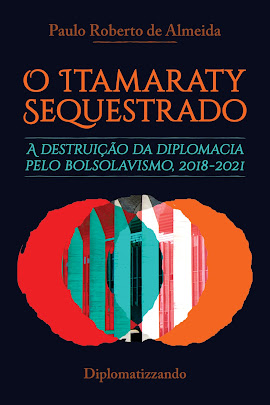O Covid-19 está apenas acelerando algumas tendências já presentes no sistema internacional, algumas mais fortes do que outras. Uma é um retrocesso parcial e temporário da globalização; na verdade, como já expliquei antes, a globalização micro continua, com alguns obstáculos pontuais, mas a globalização macro reverte, enquanto idiotas estiverem no comando de grandes economias.
A outra tendência é a ascensão irresistível não só da China, mas da Ásia Pacífico em geral, mas essa é apenas uma correção de rota no cenário global que tinha sido desviado do seu rumo nos últimos cinco séculos, em parte por mudanças objetivas na evolução de certas sociedades, mas também por decisões erradas tomadas por dirigentes idiotas.
Uma terceira é o reforço da Alemanha no contexto europeu e no mundo em geral, graças à sua preclara direção nos últimos anos e à produtividade do seu povo.
Não esquecer que 80 anos atrás, graças a essa mesma produtividade, mas numa situação de stress econômico e político, essa mesma nação se deixou seduzir por um demagogo psicopata que a levou à completa ruína, assim como quase toda a Europa e boa parte do mundo.
O Brasil e os brasileiros não se caracterizam por uma grande produtividade, mas são peritos em produzir demagogos, embora seja a primeira vez que temos um psicopata no comando da nação.
Paulo Roberto de Almeida
The Atlantic, Washington DC – 5.5.2020
The Rest of the World Is Laughing at Trump
The president created a leadership vacuum. China intends to fill it.
Anne Applebaum
It looks, at first, like one of a zillion unfunny video clips that now circulate on the internet: “Once Upon a Virus” features cheap animation, cheesy music, and sarcastic dialogue between China—represented by a Lego terra-cotta warrior with a low, masculine voice—and the United States, represented by a Lego Statue of Liberty with a high, squeaky voice. They “speak” in short sentences:
“We discovered a new virus,” says the warrior. “So what?” says the Statue of Liberty.
“It’s dangerous,” says the warrior. “It’s only a flu,” says the Statue of Liberty.
“Wear a mask,” says the warrior. “Don’t wear a mask,” says the Statue of Liberty.
“Stay at home,” says the warrior. “It’s violating human rights,” says the Statue of Liberty
The dialogue goes on like that—“It will go away in April,” the Statue of Liberty says at one point—until it ends, finally, with the statue on an intravenous drip making wild and contradictory statements while the warrior jeers at her.
Although this looks like an I’m-bored-at-home amateur production, it is not: The video was published on April 30 by Xinhua, the official Chinese news agency. It has since been promoted by Chinese diplomats and watched, as of yesterday afternoon, by more than 1.6 million people around the world.
It has also been mocked and denounced as crude propaganda—which, of course, it is. Crude propaganda is what China’s leaders do, both at home and abroad, and since the pandemic began they have stepped up their efforts. But even those who are mocking should beware: Anybody who knows any history will be aware that propaganda—even the most obvious, most shameless propaganda—sometimes works. And it works not because people necessarily believe that all of it is true, but because they respect the capabilities or fear the power of the people who produced it.
PROPAGANDA ALSO works best in a vacuum, when there are no competing messages, or when the available alternative messengers inspire no trust. Since mid-March, China has been sending messages out into precisely this kind of vacuum: a world that has been profoundly changed not just by the virus, but by the American president’s simultaneously catastrophic and ridiculous failure to cope with it.
The tone of news headlines ranges from straight-faced in Kompas, a major Indonesian news outlet—Trump Usulkan Suntik Disinfektan dan Sinar UV untuk Obati Covid-19, or “Trump Proposes Disinfectant Injection and UV Rays to Treat COVID-19”—to snide, from Le Monde in France—Les élucubrations du « docteur » Trump, or “The Rantings of ‘Doctor’ Trump.” The incredulous first paragraph of an article in Sowetan, from South Africa, declares that “US President Donald Trump has again left people stunned and confused with his bizarre suggestion that disinfectant and ultraviolet light could possibly be used to treat Covid-19.” El Comercio, a distinguished Peruvian newspaper, treated its readers to photographs of Deborah Birx, the White House coronavirus-response coordinator, grimacing as the president asked her whether the injection of disinfectant might be a cure.
Quotations from the president’s astonishing April 23 press conference have appeared on every continent, via countless television channels, radio stations, magazines, and websites, in hundreds of thousands of variations and dozens of languages—often accompanied by warnings, in case someone was fooled, not to drink disinfectant or bleach. In years past, many of these outlets presumably published articles critical of this or that aspect of U.S. foreign policy, blaming one U.S. president or another. But the kind of coverage we see now is something new. This time, people are not attacking the president of the United States. They are laughing at him. Beppe Severgnini, one of Italy’s best-known columnists, told me that while Italians feel enormous empathy for Americans who have suffered as they have, they feel differently about Trump: “In this time of darkness and depression, he keeps us entertained.”
But if Trump is ridiculous, his administration is invisible. Carl Bildt—a Swedish prime minister in the 1990s, a United Nations envoy during the Bosnian wars, and a foreign minister for many years after that—told me that, looking back on his 30-year career, he cannot remember a single international crisis in which the United States had no global presence at all. “Normally, when something happens”—a war, an earthquake—“everybody waits to see what the Americans are doing, for better or for worse, and then they calibrate their own response based on that.”
This time, Americans are doing … nothing. Or to be more specific, because plenty of American governors, mayors, doctors, scientists, and tech companies are doing things, the White House is doing nothing. There is no presidential leadership inside the United States; there is no American leadership in the world. Members of the G7—the U.S. and its six closest allies—did meet to write a joint statement. But even that tepid project ended in ludicrous rancor when the American secretary of state, Mike Pompeo, insisted on using the expression “Wuhan virus” and the others gave up in disgust. Not only is the president talking nonsense, not only is America absent, but the nation’s top diplomat is a caricature of a tough guy—someone who throws around insults in the absence of any capacity to influence events.
Others are drawing even more radical conclusions, and with remarkable speed. The “disinfectant” comments—and the laughter that followed—mark not so much a turning point as an acceleration point, the moment when a transformation that began much earlier suddenly started to seem unstoppable. Although we are still only weeks into this pandemic, although the true scale of the health crisis and the economic catastrophe is still unknown, the outline of a very different, post-American, post-coronavirus world is already taking shape. It’s a world in which American opinions will count less, while the opinions of America’s rivals will count more. And that will change political dynamics in ways that Americans haven’t yet understood.
LOOK BEYOND the Lego video at China’s more serious public-relations campaign: the stunts at airports around the world, from Pakistan to Italy to Israel, designed to mark the arrival of Chinese aid—masks, surgical gowns, diagnostic tests, and sometimes doctors. These events all have a similar script: The plane lands; the receiving nation’s dignitaries go out to meet it; the Chinese experts emerge, looking competent in their hazmat gear; and everyone utters words of gratitude and relief. Of course some of this, too, is propaganda.
In reality, some of the equipment billed as aid has been purchased, not donated. Some of it, especially the diagnostic tests, has turned out to be defective. Some of those who receive these goods also know perfectly well that they are designed to silence questions about where the virus came from, why knowledge of it was initially suppressed, and why it was allowed to spread around the world. If, in these circumstances, the propaganda “works,” that’s because those who receive it have made a calculation: Pretending to believe it is a way of acknowledging and accepting Chinese power—and, perhaps, a way of expressing interest in Chinese investment.
In the Western world, this dynamic has played itself out with striking success in Italy. Flattened by the virus and depressed by the lockdown, Italians are deeply divided by years of conspiratorial social-media campaigns, some with Russian backing, that have attacked Italy’s traditional alliances, NATO as well as the European Union. China has added its own unsubtle social-media campaign. Bots have been promoting Chinese-Italian-friendship hashtags (#forzaCinaeItalia) and thank-you-China hashtags (#grazieCina). But there is another, less visible layer of activity, too.
A year ago, Italy became the core European member of the Belt and Road Initiative, the Chinese trade-and-infrastructure project designed to create deeper links across Eurasia and to provide an alternative to the transatlantic and Pacific trade pacts quashed by Trump. Foreign Minister Luigi Di Maio, until recently the leader of Italy’s anti-EU Five Star Movement, has cultivated links to China too. Chinese investment has gained importance. Already, a Chinese oligarch has bought the Inter Milan soccer club; Chinese banks already own big stakes in Italian companies like Eni and Fiat.
Thanks to the economic havoc created by the coronavirus, China’s efforts in Rome may now bear fruit. Maurizio Molinari, the editor of La Repubblica, told me that Chinese businessmen are right now building on their contacts, looking for companies and properties to buy, scouting out factories that are suddenly bankrupt and entrepreneurs who want to sell out. I asked him what the source of China’s appeal was right now: “Money,” he replied. By contrast, the most conspicuous gesture that the U.S. administration has made in Italy’s direction since the pandemic began was Trump’s abrupt decision to ban flights. Apart from a modest and belated aid package, little in the way of friendship came from the United States.
CHINESE PROPAGANDA may find unexpectedly fertile ground elsewhere too. Chinese aid has also been delivered to Japan and South Korea, two U.S. allies who have sought close relationships with Trump and have received, in exchange, demands that they pay more for American bases. As close neighbors and former foes, both countries have many reasons to be wary of China. But now that Trump is a laughingstock, now that America is absent from the game, some in both Tokyo and Seoul may conclude that they should start hedging bets. China has also offered major assistance to Iran, a country that had already been given a major role as a Belt and Road hub. Iranian leaders now have extra reasons to hope they can outlast sanctions if the American president calling for them need not be treated as a serious person.
China’s relationships with the Arab world have also deepened during the pandemic. Qatar, Saudi Arabia, and Kuwait sent aid to Wuhan during the earlier part of the crisis; later, China reciprocated. The foreign minister of the United Arab Emirates has described China as the role model to follow in this crisis. On March 8, Chinese medical workers arrived in Baghdad—an advance team, perhaps, poised to take advantage of the inevitable American retreat. In each one of these places, America is absent, distracted, stumbling—and laughable.
Peter Beinart: Trump’s break with China has disastrous consequences
To be absolutely crystal clear: I am not praising China’s efforts. I am simply calling attention to the fact that, in a world where people laugh at the American president, they might succeed. Inside the bubble of officials who surround Pompeo, it may well seem very brave and cutting-edge to use the expression “Wuhan virus” or to call for bigger and bolder rhetorical attacks on China. But out there in the real world—out there in the world where Pompeo’s boss is perceived as a sinister clown, and Pompeo himself as just the sinister clown’s lackey—not very many people are listening. Once again: A vacuum has opened up, and the Chinese regime is leading the race to fill it.
Judging from their own recent statements, Trump-administration officials do not yet understand the significance of the chaos they have created in place of what used to be American foreign policy. Pompeo has spent time in recent days trying to organize sanctions on Iran, as if Russia and China or even European allies were still willing to follow his lead. Philip Reeker, assistant secretary of state for Europe (or rather, acting assistant secretary of state for Europe, because the Trump administration is in constant chaos) was recently asked by French journalists whether the coronavirus crisis could repair the poor state of transatlantic relations. His pompous response made him sound like a member of the Soviet nomenklatura at the end of the 1980s: “I don’t agree with the premise of your question,” Reeker said, before claiming that transatlantic engagement, and particularly Franco-American cooperation, is “remarkable.” Yes, it’s remarkable—remarkably invisible.
EVEN THE MORE learned analyses of U.S.-China relations suddenly look out of sync with reality. It’s all very well for think-piece authors or former Trump-administration officials to suggest that a post-pandemic America must change its relationships with China, rally its allies to defy China, and rewrite the rules of commerce to exclude China. But when Trump seeks to lead the world against China, who will follow? Italy might refuse outright. The European Union could demur. America’s close friends in Asia might feel nervous, and delay making decisions. Africans who are furious about racism in China—African students have been the focus of heavy discrimination in the city of Guangzhou—might well do a quick calculation and seek good relations with both sides.
I wish I could say for certain that a President Joe Biden could turn this all around, but by next year it may be too late. The memories of the prime minister at the airport, welcoming Chinese doctors, will remain. The bleach jokes and memes will still cause the occasional chuckle. Whoever replaces Pompeo will have only four short years to repair the damage, and that might not be enough.
And if Trump wins a second term? Any nation can make a mistake once, elect a bad leader once. But if Americans choose Trump again, that will send a clear message: We are no longer a serious nation. We are as ignorant as our thoughtless, narcissistic, ignorant president. Don’t be surprised if the rest of the world takes note of that, too.
ANNE APPLEBAUM is a staff writer at The Atlantic. She is a senior fellow of the Agora Institute at Johns Hopkins University. Her latest book is Red Famine: Stalin's War on Ukraine.




 Eles participaram nesta segunda-feira (5/4) do seminário virtual Voz da Experiência. O evento é organizado pela TV ConJur e foi apresentado Nelson Jobim, ex-presidente do STF e ex-ministro da Justiça.
Eles participaram nesta segunda-feira (5/4) do seminário virtual Voz da Experiência. O evento é organizado pela TV ConJur e foi apresentado Nelson Jobim, ex-presidente do STF e ex-ministro da Justiça.


















